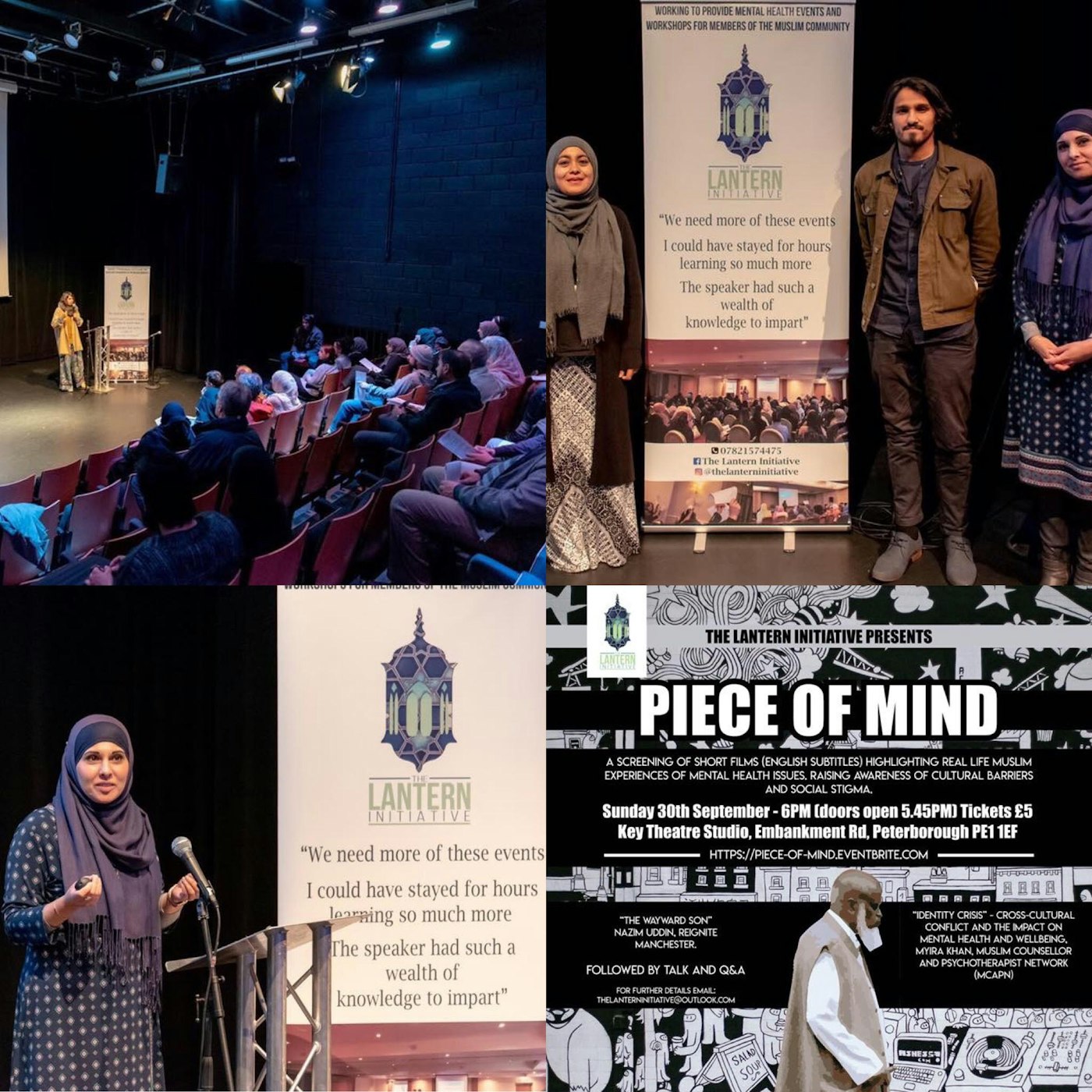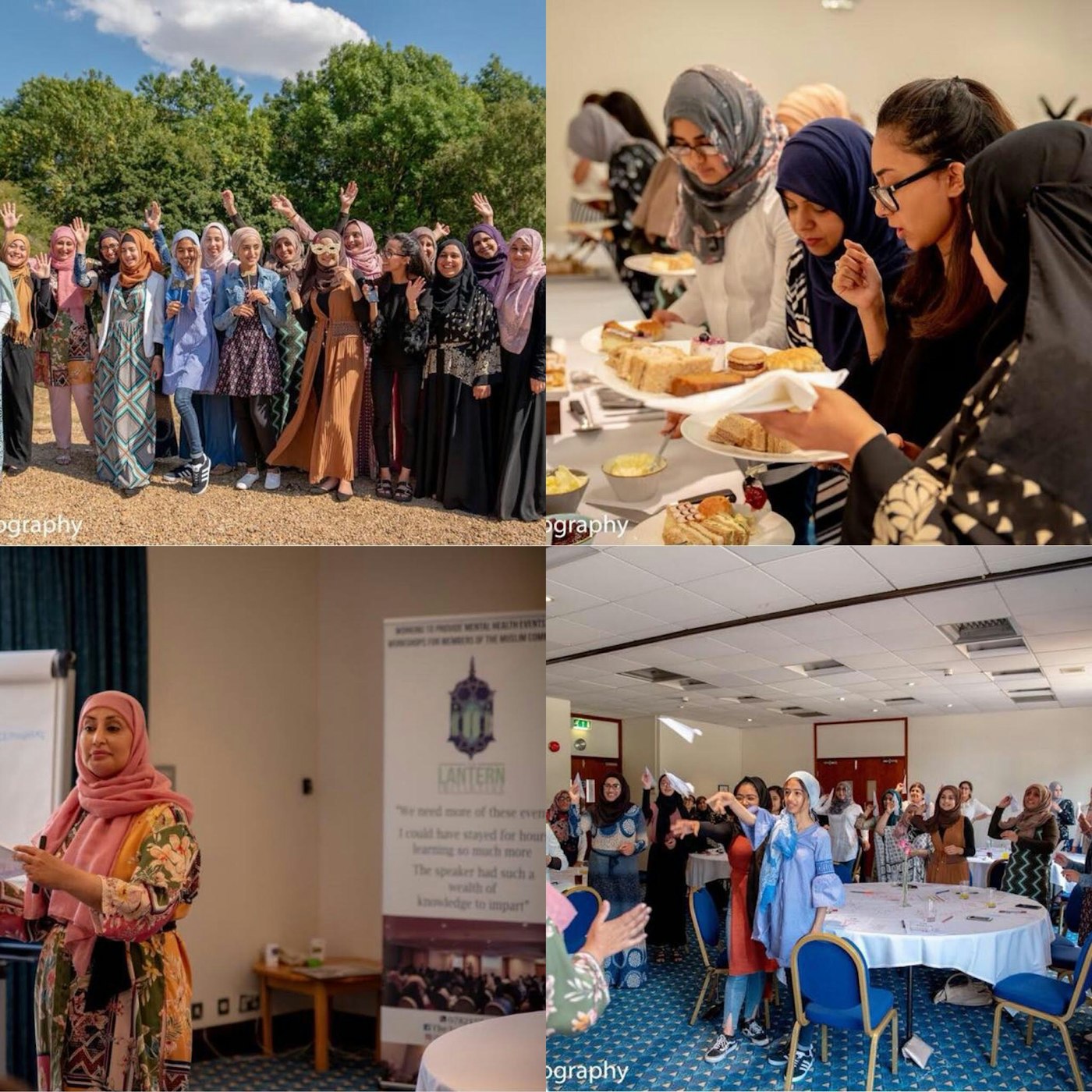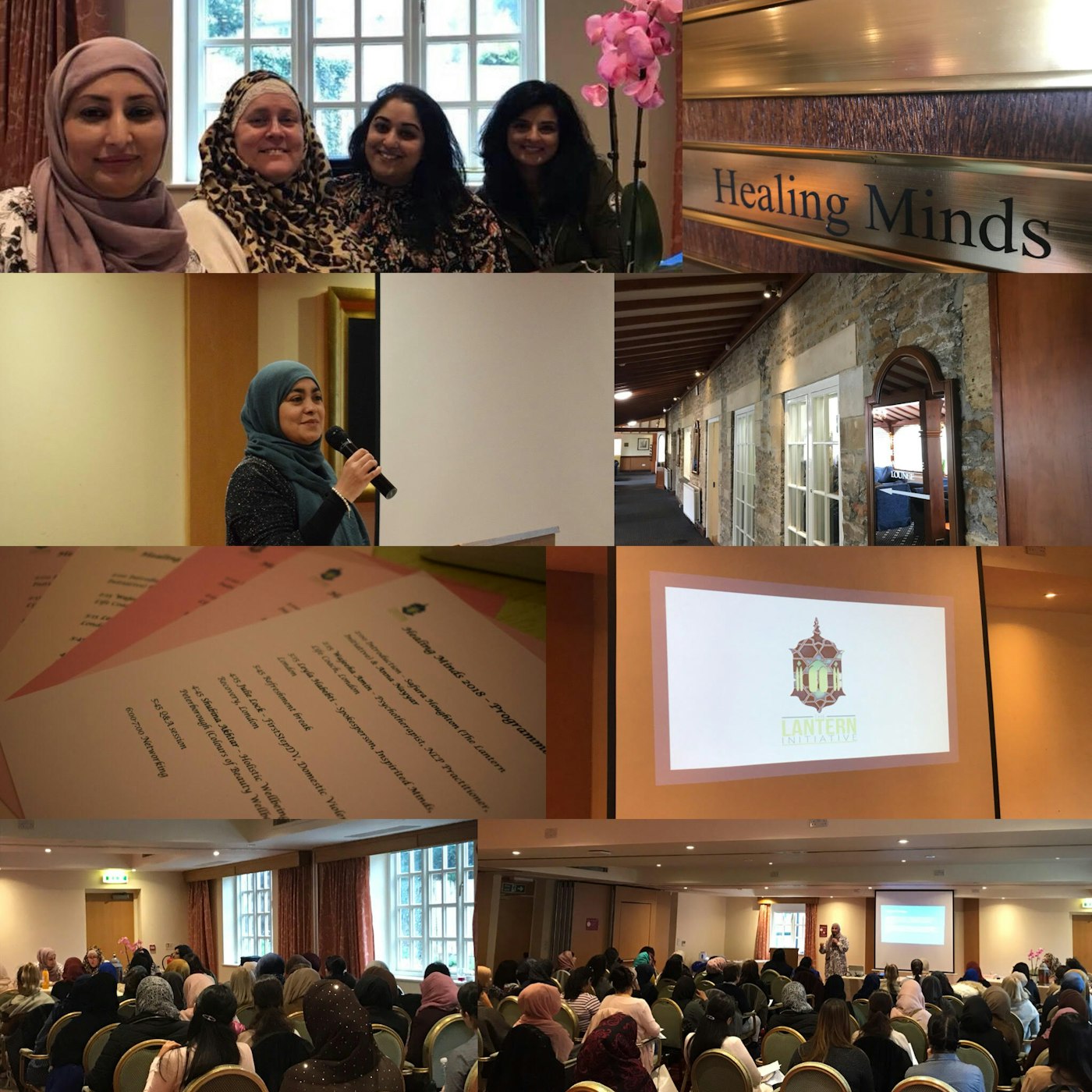The Lantern Initiative Was Born Out of a New Mother’s Isolation…
by The Lantern Initiative in Culture & Lifestyle on 16th March, 2021

With cuts to mental heath services across the UK, community organisations have rushed to support those being failed by the system, The Lantern Initiative is a Muslim run community initiative currently based in Peterborough, Cambridgeshire and run solely by volunteers in their spare time, the founder being a mother of four, Safura Houghton who shares with Amaliah that the aims of the organisation are to educate and raise awareness of mental health issues in the Muslim community, to help break down some of the associated stigma and to empower communities in seeking and accessing help – which she is doing. They’ve even started to work with several charities and UK mental health organisations, as well as teaming up regularly with award winning psychotherapists such as Wajeeha Amin and Myira Khan.
How did The Lantern Initiative come about?
“When my third child was born I felt isolated, a mother looking for validation, appreciation, a sense of belonging in my new identity of ‘Mum’ and not finding it within my local mosques and Muslim community groups. It was like I didn’t belong in the mosque with my baby. I started to organise coffee mornings and get togethers for other mums and soon realised how many of us felt this way. Very quickly we became sources of strength for one another, providing a listening ear and a shoulder to cry on where needed. Although the group didn’t have a name at the time this is where the idea for The Lantern Initiative was born.
Over the next few years as the group grew I started to think about how we could address the issue of postnatal depression since it was such a big factor in so many of our lives.
After attending an event in London where I heard some wonderful inspirational women speak and met women like Wajeeha Amin and Aaliyah Shaikh who really touched me with their speeches and left me inspired. I met Leyla Hyda and Julie Lock who spoke of the abuse and the subsequent mental health issues they suffered in their lives and how they traversed this. I knew we had to bring these amazing women to speak to our group so I invited them to help us present our very first seminar event in Milton Keynes back in 2015. This first event was fully booked out, Alhamdulillah.
These women will always be seen as the trailblazers who made it ok for us to vocalise our fears and feelings and to really acknowledge what we were going through. By openly voicing their own pain and their fears they opened up the doors for so many of us to speak up and speak out.”
What’s your personal background and how have you developed whilst building TLI?
“I initially qualified as an Early Years practitioner but as a mother of four girls I took more than 10 years out of work to raise my family. During this time I also homeschooled my older two for a period of 5 years. Being a mother is the most rewarding yet also the most challenging role a woman will ever experience. My years as a home educator and stay at home mum helped shape who I am today. The time I spent in solidarity with other mums made me realise how little meaningful support there actually is for us in the Muslim community and spurred me into doing more for the women around me.
We are expected to instantaneously embrace and accept the role of motherhood with so much energy, happiness and satisfaction – when actually this is not the reality for so many and the struggles of motherhood are not always acknowledged with honesty.
Whilst building The Lantern Initiative I decided to embark on the journey of Chaplaincy. I re-trained at the Markfield Institute and now work as a Muslim chaplain supporting women in the prison system. My new role as Chaplain and Mental Health First Aider feels like a culmination of all my community work over the years. Supporting others in their personal journeys alongside their faith is exactly what I have always sought to do.”
What have you learnt about Mental health and spirituality?How has your own understanding developed?
“As Muslims we have a unique set of needs and nuanced mental health issues which cannot be placed in a one-size-fits-all box. The sooner we realise this as communities the more we improve rates of recovery and prevention.
Islam in all its beauty recognises mental health issues and provides the essential toolkit for every Muslim. We practice self Ruqyah, we engage in the remembrance of Allah and we embrace hope always.
These are the basic practices we follow as part of our faith which also act as precautionary measures, whilst also remembering that we will be tested with illnesses and trials in this life.
Allah Himself tells us in the Quran; “Ye shall certainly be tried and tested in your possessions and in your personal selves” 3:186
But He also tells us; Do not lose heart nor fall into despair! You shall triumph if you are believers – 3:139. We are reminded to never lose hope.”
As clichéd as it may sound, we will only be burdened with what we can bear, and Allah truly test those He loves.
“There is a profound beauty and comfort in this even when we are hurting and struggling – a knowledge deep down that the love Allah has for us is beyond anything we can measure or comprehend, and that He will bring us ease after hardship because Allah has promised this in the Quran. The comfort we can take from His words is immense. The hope we find within the teachings of Islam can keep us going no matter how tough the going gets. As Muslims dealing with mental health issues, we must look towards our faith too for comfort and healing because this naturally goes alongside any medical interventions or therapies, they are complimentary. We are taught to tie our camel, ie to undertake the required treatment, but to have faith in Allah.
For healing is in Allahs hands.
Spirituality is a huge part of our lives as Muslims, therefore one must strive to incorporate reflection, contemplation and dhikr into one’s life as a basic self-care strategy.”

In an article you wrote “Sweeping mental health under the prayer mat” you discuss the taboos in the community around the topic and specifically mosques. What can mosques do and have you seen any positive models or examples of this?
“Culture, marginalisation and identity all play a huge part in our experiences of mental illness. These are very pertinent topics mosques need to address; how a young person is being supported in their identity. How Islamophobia might be the root cause for anxiety/depression for some. How a new mother unsupported by her community might develop severe postnatal depression. Mosques can do a lot to tackle some of these social issues thereby reducing the chances of mental illness in their congregations from reaching threatening levels.
If Imams and community leaders within mosques talk about mental health more openly this gives communities the right message; that its ok to talk about these very valid topics. That it’s not weak to acknowledge the existence of mental health issues. Imams hold an influential position especially with Muslim males, and this is ideally where the message should start filtering down from. Male mental health issues should be at the forefront of our community work because traditionally in most South Asian and other Muslim cultures it is seen as a weakness for a man to discuss his feelings. In Islam this couldn’t be further from the truth. We know that our beloved prophet Muhammad SA became overwhelmed with emotion during the revelation of the Quran. He wept out of mercy for the sick and the dead. He grieved when he lost his children and grandchildren. His eyes overflowed with tears when he recited the Quran. As Muslims endeavouring to reconnect with our mental health we need to remind ourselves of examples not just from the life of our beloved prophet Muhammad SA but also of the companions and many of the other prophets.
According to research carried out by world renowned Consultant Psychiatrist Dr Asim Yusuf the UK Muslim population are approximately 20 years behind the rest of the indigenous population when it comes to psycho-education, levels of stigma etc – so clearly there is still a lot of work to be done.
There are some wonderful projects happening around the UK, with some mosques being more proactive than others, however so much more work is needed. Our efforts need to be proportionate to the vast numbers of Muslims currently suffering from mental health issues in the UK.
According to the Institute for Healthcare, research suggests that membership of a religious community which is accommodating and compassionate can benefit an individual’s overall mental and physical health, and even the length of an individual’s life. Members of the Muslim community need to feel a real sense of identity and belonging in order to foster good mental wellbeing. This is certainly something every mosque can help ensure.”
How has your work in the community been received?
“We’ve had mixed responses over the years but mostly we receive very positive feedback. Generally when we hold a seminar event we get more requests from other towns and cities around the UK wanting to host similar events. It’s very encouraging and shows that people are starting to take mental health issues much more seriously.
In a smaller city like Peterborough it’s not always easy to get people to attend our workshops and events even though most of them are free of charge. We’ve had women contacting us to say they would like to attend but are scared about who might see them and what might get reported back to their families.
We’ve had people tell us that if a young girl was seen at these events the community would think she had mental health problems and that she would never be able to get married. We are working hard to challenge the mindset and to make mental health less of a taboo. I guess this is where the real challenge lies!
As Muslim communities we are still also battling with the misconception that every mental health problem is linked to Jinn possession and the evil eye. Ibn Sina (also known as Avicenna – the founder of Modern Medicine) rejected the concept of mental illness being linked to evil spirits, and viewed mental disorders as conditions that were physiologically based.
We have to remember our Muslim pioneers in the field of mental health throughout history. Muhammad Ibn Zakariya Al Razi, one of the greatest Muslim physicians, established the first psychiatric ward in Baghdad, Iraq in 705CE. This was the first psychiatric hospital in the world. According to al Razi’s views, mental disorders were considered medical conditions, and were treated using psychotherapy and drug treatments.
There are so many different micro cultures and variations in Muslim views on mental health, we find that our events and workshops have to be adapted depending on the audience. Ultimately though it’s wonderful to be able to offer faith sensitive and culturally sensitive mental health support because it’s very difficult to get this via the NHS.”
Are the events just for Muslim women? How do you want a Muslim woman to feel when she leaves the event?
“We hold different events and workshops catering both for men and women as well as young people. Generally we try to have as many mixed events as possible but sometimes women-only events are received more positively, depending on the content and topics being discussed.
We want women to feel empowered and better informed when they leave one of our events. We like to think each and every attendee will take something beneficial away. A lady who attended our Healing Minds event in Croydon sent us this comment afterwards;
“This event for me personally is one I relished from start to finish. My attention didn’t wane despite only have 4 hrs sleep the night prior. It left me feeling a great sense of responsibility towards my sisters. Too many of us are isolated and isolate ourselves. We try to reach out into a deafening silence. There were other sisters who felt the same. This needs to stop. We need more of these events. Maybe even a whole course. I could have stayed for hours learning so much more. The sisters had such a wealth of knowledge to impart. Selflessly sharing and helping us. I can’t wait for another event like it or a continuation of it.” – R.K, Croydon.
Reading back all our feedback testimonials helps us to realise how much we need to continue with this work but also that we need to encourage others to do more of the same. People are crying out for support wherever you look.”
Can you tell us a bit about the types of events you organise?
“Our most popular event to date is Healing Minds, which is a seminar event for ladies. We typically have a panel of four guest speakers covering topics such as depression & anxiety, psychological trauma, the link between abuse and mental health issues, postnatal depression, cultural barriers, where to seek help etc. We’ve held Healing Minds in Milton Keynes, Croydon, Peterborough and North London so far, with our next one being held in East London this November.
Healing Minds is designed to raise awareness as well as give attendees a raw and personal insight to mental wellbeing and to learn about why it’s so important. Often people think our events are just for people who suffer from mental health issues, and we have to explain that actually anyone and everyone should attend because there may be a time you need to support a loved one. According to The Mental Health Foundation, suicide is high in young Asian women compared to other ethnic groups. Research also suggests that Western approaches to mental health treatment are often unsuitable and culturally inappropriate to the needs of Asian communities. We have to be able to explore our own issues as BAME women and figure out what sort of therapies and treatments are likely to work for ourselves and our communities. We cannot do this until we engage in discussion and dialogue about mental health, and that’s what our events are all about.
We also hold Women’s Wellbeing Workshops in Peterborough, where attendees will explore various topics over 4 sessions; including Stress, Anger Management, Confidence & Self esteem and Mindfulness. They get to learn what might help or hinder their personal growth and affect their mental wellbeing. Essentially we are equipping women with self help skills to take better control of their own mental health.
We hosted our very first mental health training day for Imams and community leaders in March, where we discussed mental health in relation to Islam, and taught attendees how to support their own communities using prophetic examples amongst many other topics.
We also hold a monthly youth drop in session called Cloud Space, where young people aged 13 and over can come along and talk in a safe non judgemental safe space if and when they need. Sadly many young people feel detached from their mosques and they need to know there are spaces they can access where they can discuss faith issues, religiosity and any other topic freely without being judged. We hear from some young people that they prefer impartial spaces not linked to their local mosque in order to truly feel they can talk openly without scrutiny.
In addition we have held screenings for mental health documentaries, workshops for parents struggling with their teens and Afternoon Tea events for mothers and daughters to bond over. We have many other exciting events and workshops in the pipeline and are always developing new and innovative ideas for future events!”
What are your future plans for The Lantern Initiative?
“We are hoping to continue with our current events as there seems to be significant demand. We take attendee feedback seriously and have taken guidance from some of the women who have attended our workshops as to what they feel the community needs more of.
In the future as resources are strengthened we hope to be able to offer more events and workshops in different parts of the UK, as well as providing more support and guidance at local level to mosques and organisations who wish to host mental health events themselves in their own localities.
We have some exciting collaborations planned over the next few months; we have already teamed up with organisations such as Muslim Youth Helpline, Inspirited Minds and MCAPN to join forces and roll out events of even better quality. We will continue with collaboration events and also plan to work closely with some of the well-established Muslim charities, Insha Allah.
Statistically, we know that Muslims seek help for mental health issues at a much later stage compared to other faith and ethnic groups, so part of our objectives are to encourage people to seek help much earlier but also to take active measures to look after their own mental health and wellbeing and know how to identify situations where professional intervention might be needed.
Over the last 3 years we have hosted many events, mainly around Peterborough and Milton Keynes but also a few in London. In the future as resources are strengthened we hope to be able to offer more events and workshops in different parts of the UK, as well as providing more support and guidance at local level to mosques and organisations who wish to host mental health events themselves in their own localities. Another important aspect of our work involves facilitating counselling (from an Islamic perspective) to those in great financial difficulty.”
The Lantern Initiative
The Lantern Initiative is a Muslim-led grassroots social enterprise providing psychospiritual education around Muslim Mental Health and Islamic Psychology through events, workshops, coffee mornings and retreats. Their objectives are to educate and raise awareness of mental health issues in the Muslim community, to help break down some of the associated stigma and to empower communities in seeking and accessing help. TLI are based primarily in Leicester but carry out their work in various cities in the UK and abroad.

